Related Research Articles
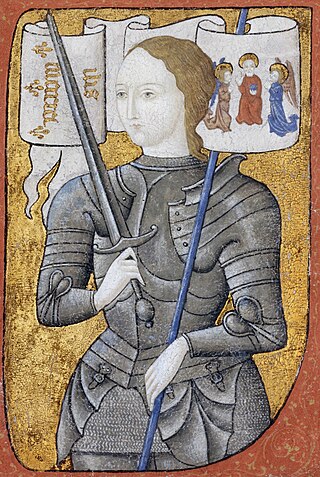
Joan of Arc is a patron saint of France, honored as a defender of the French nation for her role in the siege of Orléans and her insistence on the coronation of Charles VII of France during the Hundred Years' War. Claiming to be acting under divine guidance, she became a military leader who transcended gender roles and gained recognition as a savior of France.

The siege of Orléans marked a turning point of the Hundred Years' War between France and England. The siege took place at the pinnacle of English power during the later stages of the war, but was repulsed by French forces inspired by the arrival of Joan of Arc. The French would then regain the initiative in the conflict and began to recapture territories previously occupied by the English.

The Passion of Joan of Arc is a 1928 French silent historical film based on the actual record of the trial of Joan of Arc. The film was directed by Carl Theodor Dreyer and stars Renée Jeanne Falconetti as Joan. It is widely regarded as a landmark of cinema, especially for its production, Dreyer's direction and Falconetti's performance, which is often listed as one of the finest in cinema history. The film summarizes the time that Joan of Arc was a captive of England, depicting her trial and execution.

Étienne de Vignolles, Sieur de Montmorillon, Chatelain de Longueville, also known as La Hire, was a French military commander during the Hundred Years' War.

Joan of Arc is a 1948 American hagiographic epic film directed by Victor Fleming, and starring Ingrid Bergman as the eponymous French religious icon and war heroine. It was produced by Walter Wanger and is based on Maxwell Anderson's successful Broadway play Joan of Lorraine, which also starred Bergman, and was adapted for the screen by Anderson himself, in collaboration with Andrew Solt. It is the only film of an Anderson play for which the author wrote the film script. It is the last film Fleming directed before his death in 1949.
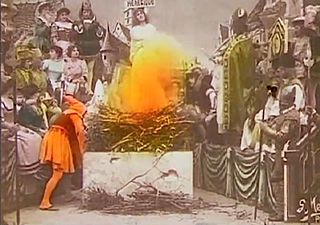
Joan of Arc is a 1900 French silent film directed by Georges Méliès, based on the life of Joan of Arc.
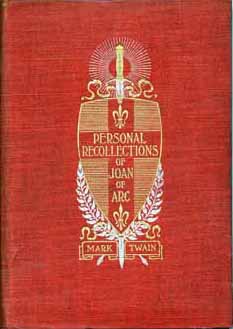
Personal Recollections of Joan of Arc, by the Sieur Louis de Conte is an 1896 novel by Mark Twain which recounts the life of Joan of Arc.

The Trial of Joan of Arc is a 1962 French historical drama film written and directed by Robert Bresson. Florence Delay stars as Joan of Arc, a French military leader, who is undergoing a trial on the charge of heresy in 1431, during the Hundred Years' War.
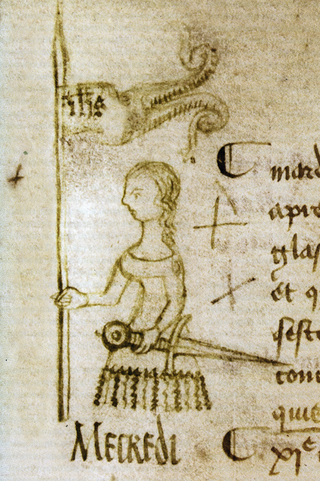
There are a number of revisionist theories about Joan of Arc which contradict the established account of her life. These include the theories she was an illegitimate royal child; that she was not burned at the stake; that most of her story is a fabrication; and that she escaped death at the stake. These theories have not gained significant acceptance among academic historians.
Pierronne, also known as Pierrone, Pierronne la Bretonne and Perrinaïc, was a Breton woman who said she saw visions of "God dressed in a long white robe with a red tunic underneath". Pierronne, who may have met Joan of Arc in 1429, tried to defend her reputation at Corbeil. For this, Pierronne was arrested by pro-English authorities in March 1430 and burned at the stake.

Joan of Arc is a 1999 Canadian two-part television miniseries about the 15th-century Catholic saint of the same name. The miniseries stars Leelee Sobieski as Saint Joan. A joint production of the Canadian Broadcasting Corporation and Alliance Atlantis Communications, it was shown internationally in 1999.

The Trial of Joan of Arc was a 15th century legal proceeding against Joan of Arc, a French military leader under Charles VII during the Hundred Years' War. During the siege of Compiègne in 1430, she was captured by Burgundian forces and subsequently sold to their English allies. She was prosecuted by a pro-English church court at Rouen, Normandy, in 1431. The court found her guilty of heresy and she was burned at the stake. The verdict was later nullified at Joan's rehabilitation trial, which was overseen by the Inquisitor-General, Jean Bréhal, in 1456. Considered a French national heroine, she was declared a saint by the Roman Catholic Church in 1920. The trial is one of the most famous in history, becoming the subject of many books and films.

Jean d'Aulon (1390–1458) was a French knight and lord best known for serving alongside Jeanne d'Arc as her soldier, steward, bodyguard, and squire. Some sources incorrectly attribute the role of d'Arc's bodyguard to Gilles de Rais. d'Aulon was an avid and detailed journaler and his records, considered to be honest and straightforward, set the foundation for what we know about Jeanne d'Arc, including her apparent amenorrhea.

Joan of Arc, a celebrated French historical figure who was executed by the English for alleged heresy in 1431, is a national heroine of France and a Roman Catholic saint. Joan was accompanied by an army during the Hundred Years War, then adopting the garb of a soldier, which ultimately provided a pretense for her conviction and execution. A number of contemporary commentators including some scholars have described her wearing of armor including certain articles of men's clothing most notably as described by priests and officials of the Catholic Church leading up to and during her trial, as crossdressing. Whether her so-called crossdressing, and that beyond which has been misconstrued regarding her lifestyle, have implications for her sexuality or gender identity is a matter of debate among historians and queer theorists.
Jean de Metz was a French nobleman who is known primarily for his role in the exploits of Joan of Arc.

The conviction of Joan of Arc in 1431 was posthumously investigated on appeal in the 1450s by Inquisitor-General Jean Bréhal at the request of Joan's surviving family – her mother Isabelle Romée and two of her brothers, Jean and Pierre. The appeal was authorized by Pope Callixtus III.
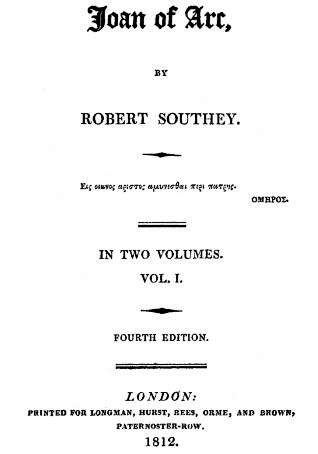
Joan of Arc is a 1796 epic poem composed by Robert Southey. The idea for the story came from a discussion between Southey and Grosvenor Bedford, when Southey realised that the story would be suitable for an epic. The subject further appealed to Southey because the events of the French Revolution were concurrent to the writing of the poem and would serve as a parallel to current events. Eventually, Samuel Taylor Coleridge helped rewrite parts of the poem for a 1798 edition. Later editions removed Coleridge's additions along with other changes.

French history has been the basis of plays in the English-speaking theatre since the English Renaissance theatre.
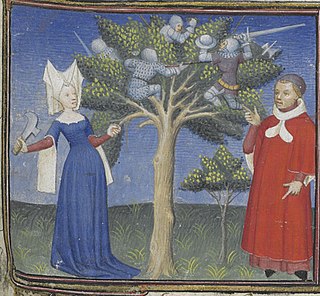
Le Ditie de Jehanne d'Arc is a patriotic lyrical verse, and the last work of the medieval French poet Christine de Pizan, who lived from 1364 to about 1430 AD. Earlier in her career Pizan wrote many texts including The Book of the City of Ladies which included tales about famous woman in history. Christine de Pizan was a professional poet in the court of King Charles VI of France. In her last work "The Tale of Joan of Arc" Pizan writes 61 verses about Joan of Arc, who led the French army to reclaim territory being held by the English. It was written before Joan lost in battle and was taken as a prisoner and right before the death of Christine de Pizan herself.
Marie Robine, also known as Marie of Avignon or Marie the Gasque, was a French mystic who was active during the time of the Western Schism.
References
- Warner, Marina (2001). Joan of Arc: the image of female heroism . Berkeley and Los Angeles, California: University of California Press. ISBN 0-520-22464-7.